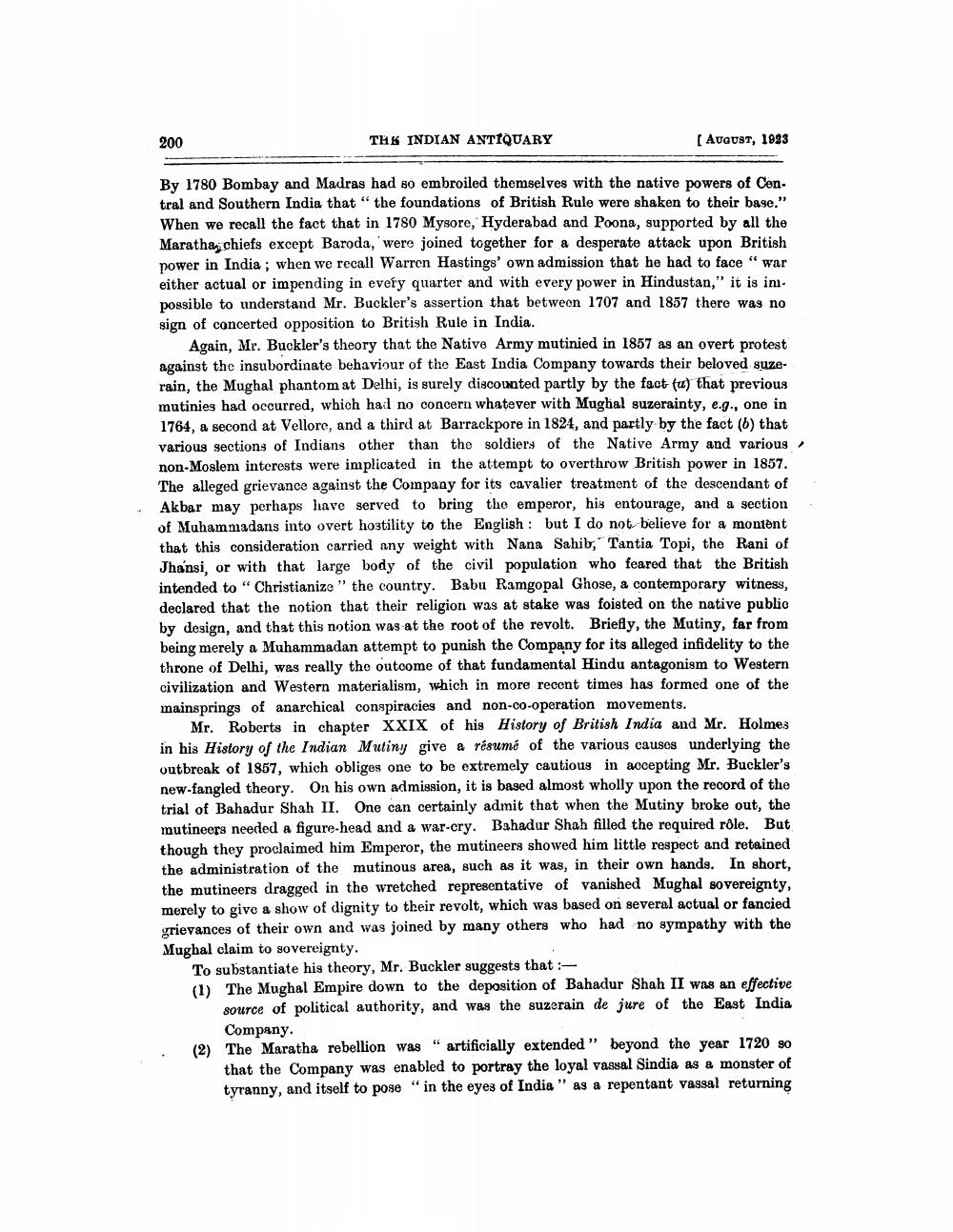________________
200
THE INDIAN ANTIQUARY
(Avaust, 1933
By 1780 Bombay and Madras had so embroiled themselves with the native powers of Con. tral and Southern India that "the foundations of British Rule were shaken to their base." When we recall the fact that in 1780 Mysore, Hyderabad and Poona, supported by all the Maratha; chiefs except Baroda, were joined together for a desperate attack upon British power in India; when we recall Warren Hastings' own admission that he had to face "war either actual or impending in every quarter and with every power in Hindustan," it is ini. possible to understand Mr. Buckler's assertion that between 1707 and 1857 there was no sign of concerted opposition to British Rule in India.
Again, Mr. Buckler's theory that the Native Army mutinied in 1857 as an overt protest against the insubordinate behaviour of the East India Company towards their beloved suzerain, the Mughal phantom at Delhi, is surely discounted partly by the fact tu) that previous mutinies had occurred, which had no concern whatever with Mughal suzerainty, e.g., one in 1764, a second at Vellore, and a third at Barrackpore in 1824, and partly by the fact (6) that various sections of Indians other than the soldiers of the Native Army and various non-Moslem interests were implicated in the attempt to overthrow British power in 1857. The alleged grievance against the Company for its cavalier treatment of the descendant of Akbar may perhaps have served to bring the emperor, his entourage, and a section of Muhammadans into overt hostility to the English: but I do not believe for a montent that this consideration carried any weight with Nana Sahib, Tantia Topi, the Rani of Jhansi, or with that large body of the civil population who feared that the British intended to " Christianize " the country. Babu Ramgopal Ghose, a contemporary witness, declared that the notion that their religion was at stake was foisted on the native publio by design, and that this notion was at the root of the revolt. Briefly, the Mutiny, far from being merely a Muhammadan attempt to punish the Company for its alleged infidelity to the throne of Delhi, was really the outcome of that fundamental Hindu antagonism to Western civilization and Western materialism, which in more recent times has formed one of the mainsprings of anarchical conspiracies and non-co-operation movements.
Mr. Roberts in chapter XXIX of his History of British India and Mr. Holmes in his History of the Indian Mutiny give a résumé of the various causes underlying the outbreak of 1857, which obliges one to be extremely cautious in accepting Mr. Buckler's new-fangled theory. On his own admission, it is based almost wholly upon the record of the trial of Bahadur Shah II. One can certainly admit that when the Mutiny broke out, the mutineers needed a figure head and a war-cry. Bahadur Shah filled the required rôle. But though they proclaimed him Emperor, the mutineers showed him little respect and retained the administration of the mutinous area, such as it was, in their own hands. In short, the mutineers dragged in the wretched representative of vanished Mughal sovereignty, merely to give a show of dignity to their revolt, which was based on several actual or fancied grievances of their own and was joined by many others who had no sympathy with the Mughal claim to sovereignty.
To substantiate his theory, Mr. Buckler suggests that :(1) The Mughal Empire down to the deposition of Bahadur Shah II was an effective
source of political authority, and was the suzerain de jure of the East India
Company. (2) The Maratha rebellion was " artificially extended ” beyond the year 1720 90
that the Company was enabled to portray the loyal vassal Sindia as a monster of tyranny, and itself to pose "in the eyes of India " as a repentant vassal returning




